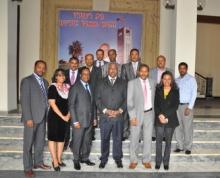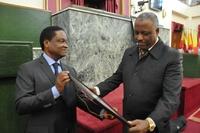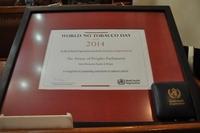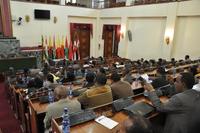The House of Peoples' Representatives Awarded by WHO for its Contribution to Tobacco Control in Ethiopia
Addis Ababa. 8 July 2014 – The World Health Organization awarded the Ethiopian House of Peoples’ Representatives with a WHO Award for the House’s landmark contribution to tobacco control in Ethiopia by ratifying the WHO Framework Convention on Tobacco Control (FCTC) on 21 January 2014. The Award was presented by Dr Pierre Mpele-Kilebou, WHO Representative to Ethiopia, on behalf of Dr Margaret Chan, WHO Director General.
Each year, as part of the celebration of the World No Tobacco Day on 31 May, WHO recognizes organizations and individuals that have made significant contributions towards tobacco control. The Ethiopia House of Peoples’ Representatives was one of six entities chosen to receive the Award this year.
Following the ratification of the WHO FCTC, the House of Representatives became a pioneer by creating a smoke-free work environment to protect non-smoking employees from secondary smoking. The House also took steps to oversee the efforts to control tobacco use in the society that the Federal Ministry of Health (FMoH) and the Food, Medicine and Health Care Administration (FMHACA) are making.
Dr Pierre M’pele-Kilebou congratulated the House for its commitment to the health of the Ethiopian people, and urged,“In the spirit of the landmark ratification, we need to work together to enhance implementation of all 38 articles of the FCTC, in a step by step, systematic and coordinated manner,” underscoring WHO’s commitment to work with the Government of Ethiopia in this regard.
Dr Kebede Worku, State Minister of Health, thanked WHO for its support in the effort towards tobacco control, and the House for its ratification of the WHO FCTC, and confirmed the Ministry’s commitment to tobacco control as tobacco use is a leading cause of preventable death from diseases such as heart and lung diseases and cancers, reminding the House that “The Ministry of Health will lead efforts to control tobacco use, but success is dependent on the involvement of all, not only law enforcement bodies, but the society at large.” He added that restricting smoking areas protects non-smokers from secondary smoke, citing the example of the FMoH’s creating a smoke-free working environment.
Speaker of the House, Honorable Ato Abadula Gemeda, on behalf of the Peoples’ Representatives, assured all gathered on the occasion, “The House of Peoples’ Representatives will not stop at the ratification of the WHO Framework Convention for Tobacco Control, but will work with all concerned throughout the country for its implementation,” and invited WHO to continue its support in this regard.
The theme of this year’s World No Tobacco Day was “Raise tobacco tax, lower death and disease!” WHO is working with the FMoH, FMHACA and sector ministries to raise tobacco taxes in Ethiopia.
The main objective of the WHO Framework Convention on Tobacco Control (WHO FCTC) is to decrease the demand and supply of tobacco and tobacco products. It is the first international treaty negotiated in response to the globalization of the tobacco epidemic. The World Health Assembly adopted the WHO Framework Convention on Tobacco Control on 21 May 2003 and it entered into force on 27 February 2005. It has since become one of the most rapidly and widely embraced treaties in United Nations history.
For more information, please contact Mr. Wassihun Melaku Belay, Health Promotion Officer, WHO Ethiopia; email: belayw [at] who.int or Mrs. Loza Mesfin Tesfaye, Communication Officer, WHO Ethioia, tesfayel [at] who.int







